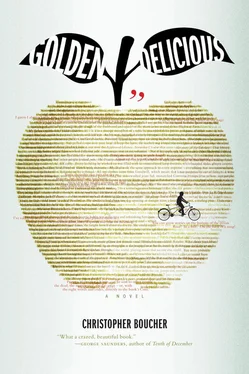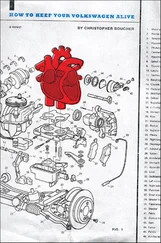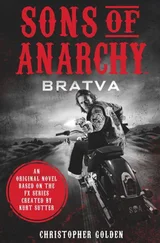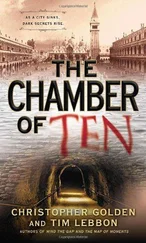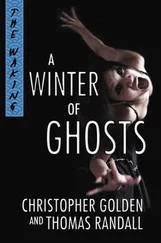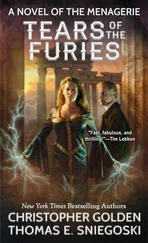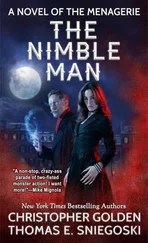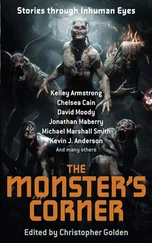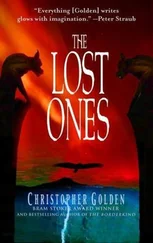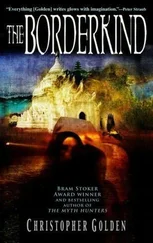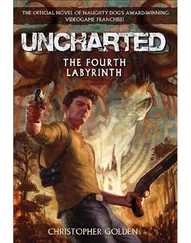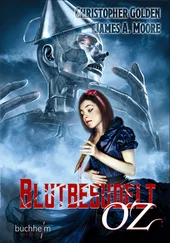“I’m worryfields about him.”
“You should tell him that,” my Dad prayed. “You should visit.”
“I will,” she prayed. “Soon as I can get away.”
“He would love to see you,” prayed my Dad. “We all would.”
A few days later, I played the song of Mothers’ Day — the national recruiting day for the Mothers of America. That was the day my Mom left us — remember? I saw that sequence again, my Mom walking out into the backyard with hardly a goodbye and lifting up into the air. We ran out after her and Bri shouted up into the sky. She wasn’t the Auctioneer that day — she was just Briana, my freaked-out sister.
Playing this song now, from third person, I could see my own face, still and dumb and silent. Why wasn’t I crying, or shouting, or saying anything at all? I should have protested more, or at least told my Mom that I loved her.
I played a pausechord, found the first-person harmony, and resumed the scene from my own eyes again. Inside my head my thoughts were howling. “Find the words,” one commanded me.
“What words?” said a second.
“The words to make her stay !” said the first.
Then I heard a noise overhead and saw something looming over the roof: a giant, dark shape. I put my hand over my forehead to shield the afternoon sun. “What is that ?” said the Reader.
It was like nothing I’d ever seen before. When I looked closer at it, though, I realized what I was seeing: those were skirts —thousands and thousands of warskirts. As the school of Mothers oomed forward in recruit formation, my mother floated toward them and joined the giant mass; soon I couldn’t distinguish her shape from anyone else’s. I understood then why she’d left so quickly; she was rushing to stay on schedule.
My sister turned to me. “Nice job, assface.”
“What did I do?” I said.
But I knew: these were my stories — every one of them.
Bri stormed inside. The Reader and I stood in the yard, watching other recruits — some of them lugging suitcases or duffel bags as they flew — join the formation. As the fleet hovered, I said a prayer. “Mom?” I prayed.
“What?” she whisperprayed back.
“Be careful,” I prayed.
“Of course,” she prayed. “Don’t worry, OK?”
Then the entire fleet began floating forward. They tightened formation, banked left, flew behind a cloud and disappeared.
The last song I ever played on that point of view piano was a third-person from our very first days in Appleseed, after I’d just begun to speak. I didn’t yet have a room — we were all still figuring out how we’d live in Appleseed. When I released my foot from the pedal, I saw my Mom and Dad standing in the basement. “It’s too cold down here for him,” my Dad said.
“But it’s spacious. It will give him room for his art,” my Mom said.
“What art ?” my Dad said.
“He can draw if he wants to,” she said. “Or write.”
“Write what?” my Dad said.
“Whatever he wants,” my Mom said.
By the fall of my senior year Appleseed was riddled with bookwormholes. It wasn’t strange to see holes in the middle of fields, human-sized holes on the sidewalk, car-sized holes in the road. There were accidents all over town: people twisting their ankles or tripping on new holes; veggiecars, swerving to miss a hole, crying right into other veggiecars.
As the bookworms took over, characters disappeared. Take my cousin Patrick — one day he was here, the next day gone. The same with the Memory of Johnny Appleseed; all of a sudden he couldn’t be found. After enough of these disappearances, the Building Cones started covering up the holes with steel plates to curb injuries.
Reader: You mean like manhole covers?
What’s a manhole?
There were all sorts of rumors about where these holes led. Some people thought they led to the Core; others, to a world of Memories. Large Odor said he didn’t think they led anywhere. But that fall, Orange Traffic Cone Scientists sent two dogs down a bookwormhole and said the dogs came back smelling of prayers.
Then, one afternoon that November, I was walking with Sentence in the worryfields and he pulled me right to one of the holes. “Come on, ‘I am.’,” I said.
He wouldn’t budge — he was fixed on the bookwormhole. It was starting to drizzle, so I tugged on his leash. “ ‘I am.’,” I said.
But the words didn’t move. By then, “I am.” was strong — three times the size he’d been when I found him.
The rain started falling harder. I picked “I am.” up and ran across the street as the sky opened its mouth and bared its sharp teeth.
Two days later, I realized that I was out of music pills and rode my bike to the pharmacy for a refill. I asked you to come along and help me pedal, but—
Reader: We’d been jumping over bookwormholes that whole week prior. I was exhausted!
So I took Sentence instead; he rode both ways perched on the handlebars, and held the bag of music pills in the teeth of his “i” on the way home.
As we were riding down Converse Street, just a few hundred feet from our driveway, Sentence suddenly looked out at the worryfields and capitalized.
“ ‘I am.’? You OK?” I said.
But “I AM.” was already moving, leaping off the Bicycle Built for Two and bolting across the street. Blue music pills spilled everywhere; I almost crashed! By the time I stopped and skimmed the page, Sentence had already reached the worryfields — he startled a couple of pacers as he shot past them.
“ ‘I am.’!” I shouted.
I waited for traffic to pass, rolled my Bicycle Built for Two across the street, dropped the tandem by the roadside, and ran through the tall white grass, calling out for Sentence. “ ‘I am.’!” I shouted. About fifty yards into the fields, I came to a hole in the page — the same bookwormhole that Sentence had been fixated on a few days before. I looked around. “ ‘I am.’!” I shouted.
“Are what?” said a worrier. I looked over at her. She was clearly a professional fretter; she was wringing her hands expertly, and her long gray hair was all thin and patchy.
“Did you see any language run through here?” I said.
“Language?” Her face lost color.
“A sentence called—”
“Why? Is that a possibility? Are you telling me there’s — wild language on these pages?”
“He’s my pet,” I said.
The worrier held up her hands. “You are totally freaking me out,” she said.
I leaned over the hole and looked down into it. I saw nothing but darkness. “ ‘I am.’!” I shouted, stupidly. My voice just bounced back at me: “I am.! I am.! I am.!”
Inside my mind my thoughts bumped into each other, fell down, stood up, and ran in circles. “Who can help?” one shouted.
“My Mom!” another shouted.
“She won’t answer your prayers!” shouted the first thought.
“Dad?” shouted a third thought.
“Too busy,” I told the third.
“What about the Reader!” shouted the first thought. “Where’s the Reader?”
I straightened up, ran across the street and burst into the house. “Reader!” I called.
You weren’t in the living room or the kitchen. I ran out to the backyard. “Reader?” I shouted.
I found you in the basement, sitting at my desk and writing in one of my yellow pads. “Hey!” I said.
You looked up from the desk.
“What are you doing?” I said.
“No — nothing,” she said, and quickly turned the pad over.
“I need your help,” I said. I told her what had happened to Sentence. “I think he went down one of the bookwormholes.”
Читать дальше
